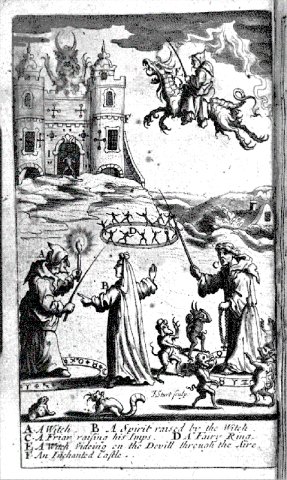Sunday, November 28, 2010
THE DEVIL'S MISTRESS by J. W. Brodie-Innes
What a lurid title! What a lurid cover! And yet, underneath it all, it's actually quite a good historical supernatural novel, based on what's known of a real case of witchcraft in 17th-century Scotland.
Isobel Goudie (sic) is the intelligent, passionate daughter of an attorney, used to an exciting life with her prosperous father. However, due to various machinations, she ends up in an unhappy arranged marriage with a cloddish poor farmer. She was raised Catholic, but he's a devout Protestant, and demands she renounce her Catholic baptism. She's generally miserable, and an attempt to spark up her loveless marriage is useless. But soon she meets a handsome stranger and is drawn to him, and through him is initiated into a coven of witches. Soon her life is a whirl of spells and enchantments, and she sees beneath the facade of local respectability. She even visits the Fair Folk for a while. But in the end, her conscience and devotion to her friends has her breaking from her love and her coven, and putting her own life in jeopardy.
Isobel Gowdie (the more common spelling) was a real person who was tried for witchcraft in 1662. Apparently she confessed voluntarily; there are no indications that she was tortured or interrogated in any way; she seemingly just walked up to the authorities one day and said, "Oh by the way, did you know I'm a witch?" Her confessions are very lengthy and detailed...and also out of sync with other known "facts" about witchcraft at the time. In fact, she established a few cliches that were unknown before her confessions were made public. It's debated if she was truly involved in some sort of coven or cult, or if she was mentally ill and her confessions were the work of a bizarre inner fantasy life. There is no record of her being executed; was she done to death, or did they decide she was crazy and put her away? (I once saw her name used by a Wiccan as an example of one of the "millions" who were "tortured and executed" for witchcraft...but as far as is known, Gowdie was never tortured or executed, and the best estimates place the number of people executed for witchcraft, based on available documentation, is below 100,000.)
Naturally, Brodie-Innes takes the view that she was a real witch, at least for the purposes of this novel. But she's not simply a cackling caricature. Isobel is a fully-realized human being, of whom another character says that she "would either be a great sinner or a great saint." She genuinely tries to make her marriage work before giving in to her otherworldly lover. She truly cares for her friends and stands by them when they need her. She wonders if her lover truly is Satan himself or just a roaming charlatan who knows some conjuring tricks. And yet she gleefully partakes in the coven's hunts, and puts her enemies under dire enchantments. And she often wonders if her supernatural adventures were just dreams.
That's one thing I truly liked about THE DEVIL'S MISTRESS; her spells and bizarre adventures with her coven are treated in a hallucinatory, dreamlike way. She'll often be in another part of Scotland as part of her working an enchantment, but then get tired, fall asleep, and wake up in her own bed. Sometimes I was tempted to think they truly were dreams, or drug trips, but another thought is that Brodie-Innes was thinking of them as astral projections, although that is never made explicit. Her workings of magic are given quite a bit of attention and detail, but are never tedious or repetitive. They're just more elements of the world the author creates. And he knew his stuff.
John William Brodie-Innes was a Scottish lawyer and bibliophile, but was most notably a prominent member of the Golden Dawn, and a significant figure in Victorian and Edwardian occultism and mysticism. He was a close associate of MacGregor Mathers, and reportedly gave Dion Fortune her training in the occult, and was the inspiration for her occult detective character in THE SECRETS OF DR. TAVENER.
I've read supernatural and horror fiction by occultists before, and Brodie-Innes is head and shoulders over all of them. All too often, an occultist's passions and beliefs translate into tiresome preachiness and didacticism, and good storytelling, plotting, and characterization take a back seat. Fortune's Tavener stories exist mainly to teach her views on occultism and psychic phenomena; another set of supernatural tales by Madame Blavatsky has its moments ("The Ensouled Violin" is flawed, but haunting) but overall is spoiled by her intention of communicating her worldview to the reader.
But Brodie-Innes simply creates a world and some fully-realized characters to populate it. Isobel is sympathetic and strong, especially when she realizes she has to part ways with her lover when she realizes she must be true to herself and the people she cares for. He never preaches or condemns, never tries to explain why the spells work or the nature of her experiences; they simply are.
I read an old copy, a 1974 printing by Sphere that is Vol. 11 in "The Dennis Wheatley Library of the Occult" that from what I've seen ranges from some genuine classics to some total crap. But it's back in print (courtesy of Ramble House) and it's worth a read. Gowdie has appeared in other novels, like ISOBEL by Jane Parkhurst, and NIGHT PLAGUE by Graham Masterson. Gowdie's "spells" have made their way into poetry anthologies, and she's also inspired songs by artists like Creeping Myrtle and Alex Harvey. Both Maddy Prior and Inkubus Sukkubus have used Gowdie's words in song. And modern composer James MacMillan composed a 1990 orchestral piece, "The Confession of Isobel Gowdie," which has met with critical and audience acclaim.
So look for Isobel; she's well worth it.
Subscribe to:
Post Comments (Atom)







No comments:
Post a Comment